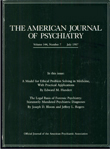Expenditures for the Treatment of Major Depression
Abstract
OBJECTIVE: Health policy makers lack accurate information about per capita spending for the treatment of major depression, the distribution of those expenditures, and the proportion of the health care dollar consumed by depression treatment. METHOD: The authors recruited and followed a community cohort of individuals with major depression; the 298 subjects were either enrolled in fee-for-service insurance plans or self-insured. Charges for all health care services received during the year following baseline were abstracted from medical and insurance records. RESULTS: Over the course of 1 year, 48.1% of the subjects received depression treatment. The per capita total expenditure for inpatient and outpatient depression treatment averaged $631, with a median of $152, for the treated subjects. Just 4.9% of the treated subjects consumed 45.0% of the outpatient expenditures. Depression treatment consumed only 8 cents of every health care dollar spent on the patients treated for depression. CONCLUSIONS: Studies are needed to examine how the level and distribution of expenditures for depression treatment change under managed care and to determine whether and how any differences affect outcomes in the afflicted population. Managed care attempts to contain costs by limiting outpatient care may not affect total health care expenditures dramatically, since depression treatment consumes such a minuscule portion of the health care dollar spent on this population. (Am J Psychiatry 1998; 155:883–888)



